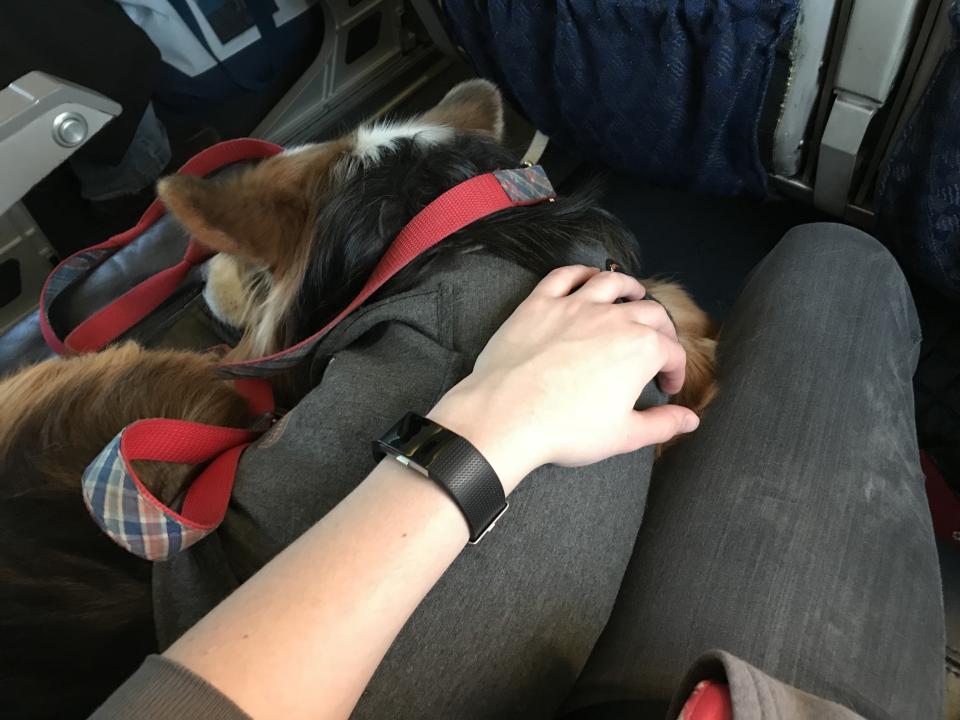Proposed airline ban on emotional support animals sparks debate
The U.S. Department of Transportation (DOT) has proposed a new policy that would give airlines the freedom to ban emotional support animals from flights, though professionally trained service dogs are protected by the Americans with Disabilities Act and would therefore be allowed to remain on board, the Wall Street Journal reports.
Disputes involving animals on flights have made headlines in recent years, from Delta being accused of rejecting a service dog last summer because it appeared to be a pit bull, to a 2018 incident in which a Frontier Airlines passenger was removed from a flight for having an “emotional support squirrel.” The safety of passengers, crew members and service dogs is also a concern, as is cleanliness, with the DOT reporting that airlines received more than 3,000 complaints about animals in 2018.
DOT officials say that the crackdown on emotional support animals who may lack formal training will prevent passengers from taking advantage of the current system by passing off their pet as a service animal, simply to avoid paying an extra charge or improve their comfort and convenience.
“When there are abuses in the system it’s the people with disabilities who suffer,” a DOT official said on a media call, Travel + Leisure reports. “Access is really important and when we do look at our responsibilities, access is one of the most — if not the most — important.”
Under the proposed new guidelines, animals that offer emotional support and companionship, as opposed to mobility, would be regarded as pets. Airlines could also restrict service animals to being just dogs, rather than ducks, iguanas, or other species, though limitations on certain dog breeds, such as Delta’s ban on pit bulls, wouldn’t be allowed.
And while the proposal is intended to make the in-flight experience safer for trained service animals accompanying passengers with disabilities and psychiatric disorders, they would also be subject to new guidelines. Airlines, for instance, could require passengers traveling with service dogs to fill out official forms and check in earlier, demand that animals be leashed and harnessed, or implement other restrictions.

Despite the potential red tape ahead, the policy is a welcome move to Karen Shirk, CEO of 4 Paws for Ability, an Ohio-based nonprofit organization which trains service dogs for veterans and children with disabilities. According to Shirk, untrained animals can pose a threat to official service dogs.
“I have seen the craziest dogs in the airport, and I’m terrified that I will end up on a plane in front of or behind one,” she tells Yahoo Lifestyle.
“I understand that there are a number of people who actually benefit from emotional support animals,” she added. “The problem is, emotional support animals are not regulated in any way, shape or form, and most of what is called an ‘emotional support animal’ is not needed.”
Shirk claims that passengers who want to take an animal on board can get it signed off from “fake therapists” online without having an actual emotional or mental disability. She would like to see stricter regulation enforced, such as receiving certification from a licensed therapist after at least a year of treatment as well as professional training for the animal.
Sara Amundson, president of the Humane Society Legislative Fund, also called the DOT plan a “much-needed move toward ending discriminatory policies by individual airlines that cause unnecessary and cruel hardships for customers with disabilities and their animals” in a blog post, citing its call to end airline bans on certain dog breeds. Amundson also approved of bans on considering exotic species like primates to be emotional support animals, noting that it addressed “concerns we have flagged in the past because of the health, safety and welfare risks involved.”
But there has been pushback, too, and not just from travelers who prefer to fly with an animal companion. A statement released by Paralyzed Veterans of America argued that the proposed regulations affecting official service dogs would be a “burden for catastrophically disabled veterans.”
"Under the proposed rule, airlines would be able to request that passengers with disabilities complete DOT forms attesting to their service animal's good behavior, health and training,” reads the statement from the group’s associate executive director of government relations, Heather Ansley. “The recommended changes would also allow airlines to require travelers with service animals to check in early for their flight.
“If implemented, these measures would create a new burden for catastrophically disabled veterans who already have to deal with damaged wheelchairs, lack of accessible lavatories and bodily harm caused from being transferred on and off the aircraft. The proposed rule would also allow airlines to prohibit transport of emotional support animals unless the individual complies will rules and fees for transporting pets. We do not support treating emotional support animals like pets. Instead, we believe there needs to be a balance between enacting requirements to prevent travelers from taking advantage of access rules when flying with animals and limiting access for people with disabilities. Catastrophically disabled veterans already have more than enough access limits in air travel."
The public has 60 days to share feedback on the proposal.
Read more from Yahoo Lifestyle:
U.S. has its first confirmed case of the coronavirus — here’s what you need to know
Here's why this flu season is shaping up to be one of the worst in years
ESPN reporter who died at 34 didn’t know he had non-Hodgkin lymphoma — how common is it to not know?
Follow us on Instagram, Facebook and Twitter for nonstop inspiration delivered fresh to your feed, every day.

